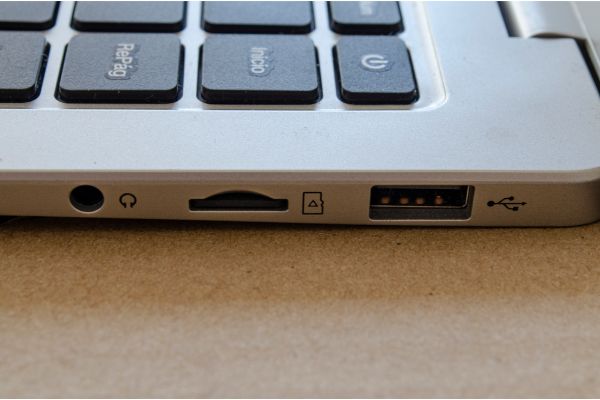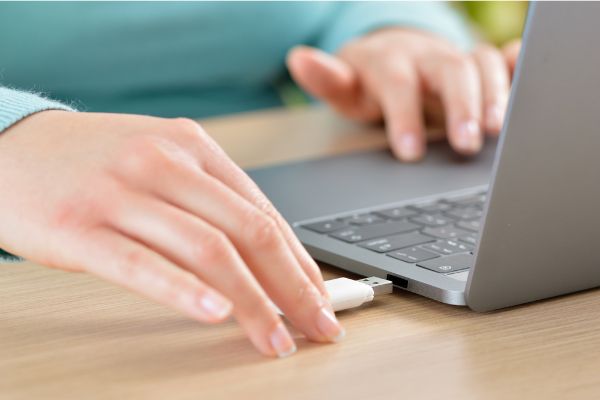Disclaimer: This post may contain affiliate links, meaning we get a small commission if you make a purchase through our links, at no cost to you. For more information, please visit our Disclaimer Page.
Universal Serial Bus ports, which you’ll often see listed as just ’USB’ ports on applicable devices, are great features that allow for easy transfer between one or more of your electronics. The beauty of USBs is that they allow large external storage devices or other things to plug right into your laptop and become useful immediately.
Typically, there is no time wasted setting things up, and you’ll be ready to go as soon as the computer recognizes a new device. You also don’t need to change any of the computer’s settings or switch it off first, which must be done in the case of other things you add to your desktop.
Because they are so flexible, USB ports have a lot of use on your average machine. Some users can’t get their USB ports to work from time to time, and they wonder what they might be able to do about it.
We’ll go through some of the possible issues you may face with ports that don’t seem to respond when you plug them in, how you might troubleshoot them, and if there are any ways to tell if a USB is bad and can’t be salvaged.
Table of Contents
Why Are My Acer Laptop USB Ports Not Working? 3 Reasons
You’ve plugged devices into your Acer laptop’s USB ports, but they don’t work. They either don’t boot up or aren’t recognized by your laptop’s system, giving you no way to “find” them within any of the computer’s drives. There could be a few reasons your Acer laptop’s USB ports are not working.
We can cover some of the potential issues you may have here, and we will address how you might troubleshoot some of these same setbacks in the next section.
1. Your Acer laptop’s USB ports might be dirty or clogged with debris. Although this issue can rarely be so bad that it causes the ports to not function or recognize when devices are plugged into them, it does happen on occasion.
Cleaning the ports may be a solution here, but you must be careful in how you do it to avoid damaging any other parts of the laptop.
2. There could be a problem with your USB port drivers. The physical ports might be fine in these cases, but the software that helps them run or recognize when devices are present is not functioning properly.
There are ways to troubleshoot this issue that might reset the drivers and allow them to see devices plugged into your Acer laptop again. We will go over some ways you can do this in the next section.
3. Although it is relatively rare, the ports might have some damage to them that prevents them from functioning. These ports are made to have things plugged and unplugged daily, sometimes multiple times daily.
However, there is no hard rule about how long the ports can last. Additionally, it is possible that forcefully plugging in devices and yanking plugs out could cause issues inside the ports that make it harder for them to connect securely to send and receive signals.
There are ways that you might check for damage to the ports, but some of them involve taking apart the Acer laptop to get a look inside. Furthermore, the actual hardware inside the ports is soldered to a board inside your laptop.
While the soldering can create a stable connection, it is possible that some points of contact inside the ports can become loose over time.
When this happens, the ports may have trouble making a solid connection with other devices. Thus, you get a USB port that doesn’t seem to work. However, there are ways to test this, and there might be some fixes you can try.
How Can I Troubleshoot USB Ports Not Working?
There’s not much to do until you know if the USB port is the issue, and this is where troubleshooting comes into play.
Once you know the port itself is bad or somehow in need of repair, you can decide how best to fix the issue, but you’ll need to determine if the port is the problem first. The test you can run to do this is fairly simple.
If there are devices that you use with your Acer laptop USB ports regularly, go ahead and plug them into the laptop once more to double-check that the computer is not recognizing them properly. Once you’ve confirmed that this is the case, unplug them and keep them handy.
If you have a desktop computer, another laptop, or any other device that can accept a connection from the cables on these USB devices, connect them to these new USB ports to see if things work.
If they function and are detected normally, we’ve narrowed the field, and it is safe to say that the USB ports on your Acer laptop could be the issue.
However, should they still not receive signals from the new computer or similar device, it may not be an issue with your laptop’s ports. This is a good first step, but we will assume that the laptop’s ports are the culprit.
There could be a software issue preventing the ports from functioning correctly. Often, this can result from drivers that are not configured correctly.
Uninstalling and reinstalling the device drivers for the ports could fix the issue.
- To do this, go to your Windows ‘Start’ location and look for ‘Device Manager.’
- Once inside this location, you can expand the ‘Universal Serial Bus Controllers’ category from the list on the side. This lists all the devices attached to your Acer laptop.
- Look for anything with a name like ‘USB Host Controller.’ This could appear under a different or longer name within your Acer laptop, but it should still be similar to these words.
- If it is not there under any similar name, this might explain why your USB ports are not working.
- Even if it is there, it may be worth it to ‘Scan for hardware changes’ to see if anything new pops up for your Acer laptop.
- You can also Uninstall the drivers for your USBs and have the Device Manager reinstall them automatically.
- You should restart your Acer laptop to see if this fixes the issue with the ports.
This is one of the more common methods you might find that can help you deal with troubleshooting USB ports. Other fixes are a bit more physical and involve cleaning the ports out to free them from debris blocking things.
However, you can use some compressed air to do this so that you don’t have to take apart the Acer laptop, which is laborious.
How Can You Tell if a USB Port Is Bad?
It can be tough to tell if a USB port is bad. The framework of the Acer laptop itself mostly hides them away.
A close inspection may involve taking the laptop apart to check the ports and their connections to the motherboard or PCB board.
While this may be necessary, we don’t recommend it for anything other than a last resort when you have tried everything else and still haven’t found the issue.
There are ways to take your laptop apart and put it back together, but there are many things to keep in mind as you go about this.
One thing you can do is test the connections using a USB device attached to the appropriate cable.
Plug the device in as you normally would. From there, grasp the connector part where the cable goes into the Acer laptop and move it around gently. You should feel very slight movement, but it should not be severe.
Furthermore, if wiggling it around does get it to connect to your Acer laptop intermittently, it could point to a physical problem with the USB port.
Can USB Ports Wear Out?
The short answer is that USB ports have some physical parts and connections so that they can wear out over time. However, no consensus exists on how long it could take for any USB port to wear out.
It is entirely possible that the ports on your Acer laptop might never wear out before you get a different computer. Some older laptops have had USB ports that could function even with daily use for many years, and it is possible that some could wear out after just months.
While there could be a quality control issue with individual computers or ports, it is more likely that user operations are one of the primary factors determining how long they will last.
For the best results, it is a good idea to plug USB devices into the ports gently. The ports themselves are made to provide a snug, secure fit without using great force.
Conclusion
USB ports are just one of the many innovations in the computer world that make connectivity easy. A single laptop can host multiple devices that can enhance its functionality, storage space, or ability to work with peripherals.
Because they make some physical connections and work with device drivers, you could run into issues with your ports in a few ways. However, there are also tests you can run to detect what the troubles might be to resolve them.


